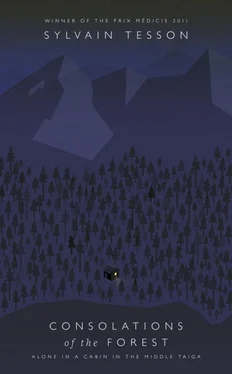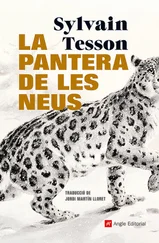The high pressures building up at the foot of the mountains plunge me into lethargy for the rest of the day. Dreary hours of ennui, rocking in the hammock.
I haven’t even the strength to read. I’m dozing beneath a cedar when a rainstorm chases me into the cabin. And then the sight of a steaming cup of tea fills me with an immense feeling of security as the heavens rampage outside. To the west, liquid chaos. Rain was invented so that we can be glad to be under a roof. The dogs are beneath the front door awning. Ideal companions for these moments of withdrawal: vodka and a cigar. They’re all that poor people and loners have left. And the health police would like to outlaw these blessings! So that we can die in good shape?
The rain has passed, the air is drying the forest. Through my binoculars I spot a bear standing two or three hundred yards away on the south shore. The bear stays perfectly still. Then I realize that the boulders are quivering in the evening air: I’m having palpitations over a mirage.
I make some bread. I knead the dough for a long time. Nothing is softer or sweeter to the touch when one is alone. It’s easy to understand the wealth of expressions exploring this relationship between flesh and dough. A woman baking things is an aphrodisiac figure, plump and rosy, evoking a healthy eroticism. I eat my bread and force myself not to think any more about women baking because I still have two months to go out in this hole.
1 JUNE
Watching the aerial displays of the ducks and geese, I sit at my table on the beach like one of those judges at a figure-skating competition getting ready to hold up their signs.
Amorous geography: I prefer shingle beaches where people shiver in wool sweaters to those deep-fryer sandy strands littered with oily bodies. Baikal’s stony shores fall into the first category.
The plugs of slushy ice blocking the bay for several days have been dispersed by the storm; the wind punished the innocent cabin all night long.
2 JUNE
Zen monks called lingering in bed in the morning ‘forgetfulness in sleep’. My forgetfulness lasts until noon.
I assemble my kayak of blue canvas, but slowly, due to my lack of technical expertise. The instructions say the assembly should take two hours. I put in five, and it’s a major victory when I glide out onto the water this evening. With a few strokes of the paddle, I regain what the breakup of the ice had cost me: the possibility of seeing the mountain whole. It has turned green. The larches have got dressed again. Up to their chests in water, Aika and Bek, in a panic, can’t figure out how to follow me and let out keening moans. Then Aika realizes that I’ll eventually come back to the beach, so they need only run beside the lake in the same direction as I’m paddling.
‘Never go more than 300 feet from shore.’ This was Volodya’s injunction up at Elohin the last time I was there. The lake water is so cold that if you capsize, you will die. No one can survive in 37°F water, and fishermen have drowned here within shouting distance of the shore, even though Jules Verne mentions the legend of this lake in Michael Strogoff: ‘No Russian has ever drowned in Baikal.’
There is water, and there are winds. Both are treacherous. Born in the mountains, the sarma can awaken in minutes and whip up waves nine feet high. Boats are swept out and overturned. The lake takes payment in men for what they take away in fish: death pays the debt. I learned recently that Volodya lost his son to the lake five years ago, and then I understood why he spent hours staring out through the clear glass. Sometimes one contemplates a landscape while thinking of the people who once loved it; the atmosphere is steeped in remembrance of the dead.
The dogs slaver their joy when I return to shore. Avian squadrons streak through the sky. Reflections offer the chance to admire Baikal’s glory twice over.
3 JUNE
Addressing the young poet Franz Xaver Kappus, Rainer Maria Rilke writes in his letter of 17 February 1903: ‘If your daily life seems poor, do not blame it, blame yourself that you are not poet enough to call forth its riches…’ And here is the American naturalist and essayist John Burroughs, in The Art of Seeing Things : ‘The tone in which we speak to the world is the one the world uses with us. Give your best and you will get the best in return.’ We alone are responsible for the gloominess of our lives. The world is grey because of our blandness. Life seems pallid? Change your life, head for the cabins. In the depths of the woods, if life remains dreary and your surroundings unbearable, the verdict is in: you can’t stand yourself! Make the necessary adjustments.
I spend an hour sawing up the trunk of a dead larch in the clearing. The wood is still viable and the growth rings clearly visible. The sun tints the tree’s flesh, making it look appetizing. There are some sights that the human eye has no right to see, as when man exposes to the light things that were not at all prepared to receive it, thus breaking a taboo, changing the writing. In The Golden Pavilion , Mishima describes the cross-section of a tree that is now open ‘to the rustling flow of the wind and the sun, for which it was never destined’. Cutting down trees, picking flowers: will we one day pay for these tiny liberties that we take with the order of things, these infinitesimal transformations of the initial set-up? When one of his disciples suggested to Confucius that irrigation ditches be dug in the kitchen garden, the sage replied, watering can in hand: ‘Who knows where that would lead us?’ The advantage, in a cabin, is that aside from the occasional felling of a tree, one doesn’t change much in the general layout.
I’m gliding over silk. The sound of paddles in the silence… The dogs didn’t whine when I set out and they’re trotting along to the south. Bek’s white coat stands out against the azaleas of the slope. Volodya was no fool: after a quarter-hour of caution, I’m boldly cutting between the capes and have wound up more than a mile from shore, sitting in a canvas craft supported by a wooden frame I put together while taking a few liberties with the instructions. I’ve reached the ice jam that floats way offshore; the frozen chunks clink in the sun. I float perfectly still on the cold oily surface. Two yards from my bow, a seal pokes its head up and stares at me. It has no arms, no legs, but the look in its eyes is something like an old man’s, a gaze as deep as its domain. I speak to the seal, which listens, peers at me nearsightedly, and dives.
4 JUNE
Every morning, upon rising, I greet the ducks. More and more of them are arriving at the lake after days of flying up along the 105th meridian east. According to the dictionary of symbols, ducks represent love and fidelity for the Japanese. As for the cedars here, they stand for virginity and purity in European esotericism. My stay is placed under the auspices of virtue.
I owe my presence here to that July day seven or eight years ago when I discovered the shores of Baikal, a first impression that became the certainty that I would one day see them again. Like those followers of the Sufi doctrines espoused by the French intellectual René Guénon, esotericists who are obsessed with finding the Golden Age, we are a few nomadic souls who seek by any means to relive the most intense moments of our existence. For some of us, these moments were in our childhood; for others, they were our first kiss under the local railway trestle, or a feeling of ineffable bliss one summer evening alive with the trilling of cicadas, or a winter’s night filled with the rumination of high-minded and generous thoughts… For me, the apex was at the edge of that sandy talus sloping down to Lake Baikal.
Читать дальше












